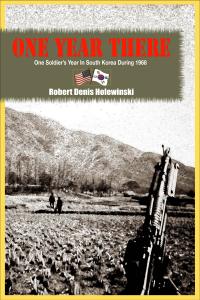20% off all products! Sale ends tonight at midnight EST.
October 17th, 2014 - 08:34 AM

"One Year There" by Robert Denis Holewinski
Review by Jim Bennett, Kindle Book Review Team member.
Remote, inhuman war situations. No combat. No heroes. No holds barred, either. Five Stars should be easy to explain: roughly equal to best in genre. This is an unusual, unsettling, and powerful collection of some 52 poems, all in free verse. While you should not let my star count override your own judgement of content, (more on the stars, counting, and my rating challenges later,) I will try to give you an insight into this unique and disturbing book. Then you can decide for yourself. I think you will agree with my assessment.
Each poem is a single closed experience, neatly captured. The point of view could be anyone: a drunk, a soldier, a black, a sergeant, and in one case, someone long dead. However, the poems sometimes interact: as you read one piece, you could gain an insight into another one.
One poem even appears to be told from the point of view of a rat. (The soldier outside the butcher shop is seen as a person with green skin!)
Holewinski uses simple, powerful narrative (with no capitals, a la e.e.cummings) to tell each piece. Occasionally, when the experience demands it, you will be treated to marvellous visual imagery, as in Patrolling the Green Mountain. For the most part, your experience will instead be visceral: what it was like to be there, in the gut/flesh.
In the opening piece, The Classroom, the conscripted all think they are going to Vietnam to be forward observers, an extremely dangerous assignment. Here repetition is used brilliantly: “those first explosions will tell the vietcong /that you are there you are near /they have been found by you /you are the reason for the bombs /(will not be coming back alive) /gentlemen from that first explosion /they will do whatever is necessary /to find you capture you kill you /they know the jungle well.” When you read the entire poem, the phrase (will not be coming back alive) keeps recurring, a nightmare-of-fear effect.
A fine image occurs in In My Hands: “in my hands /i had held my orders to vietnam /and i had existed for two weeks /wrapped in a printed paper coffin.” Again in He Counts More Years: “his arms stay slightly bent /as if the hanger is still inside /the field jacket he wears.”
One example of poems that interact is The Mess Hall Girl and later, Is He Hiding. In the former we find this: “she fought these thoughts these dreams /that wanted to be real /and on the day he left /her emptiness hurt more /than their making love.” In the latter poem, about the ‘he’ who left her, this: “the truth about him /exposed or hidden /was pretty much unimportant.” (That’s a deliberate teaser; buy the book and read these two poems in order, eh?)
There are moments of touching human kindness, as in The Orphan Visit. (No spoiler here.)
I found many favourites in this collection, including One Morning Patrol, No Hatred, Maybe Twice Late, One Year There, and My Bones. The latter (My Bones) calls back to Raining Hard, which in turn calls back to Ward Wake Up. While each poem stands alone, together the death of a soldier is told from three different points of view in time. This is a haunting book.
Back to star counts. My personal guidelines, when doing an ‘official’ KBR review, are as follows: five stars means, roughly equal to best in genre. Rarely given. Four stars means, extremely good. Three stars means, definitely recommendable. I am a tough reviewer. Five stars it is, and highly recommended.
Comments
There are no comments on this blog. Click here to post the first comment.